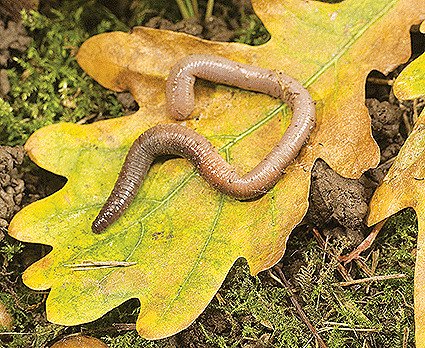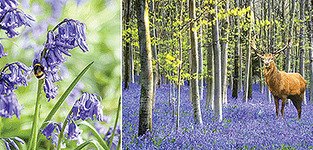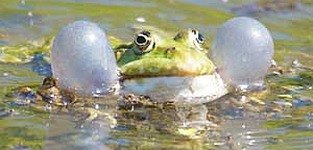Sussex Wildlife Trust: Earthworms
January 1st, 2020
We can spend all day planting and pruning, weeding and seeding, grunting and groaning in our gardens but it’s time to face the facts folks. Us gardeners aren’t the ones who are doing the hard work. The real toil is in the soil – the engine room of the garden. Because down there, beneath our wellies, earthworms are wriggling, recycling and reincarnating our gardens.
They’re so easily taken for granted. An earthworm isn’t much to look at. A tube made of muscles with a mouth at one end and a bum at the other but he and she (they’re hermaphrodites) is responsible for making your garden grow.
These burrowing beauties really mix it up in the mud. Some drag dead leaves deep underground while their wormcasts return essential minerals back to the surface. This improves soil structure and their tiny tunnels help with drainage and allow aeration.
Cleopatra declared them to be sacred and Aristotle called earthworms ‘the intestines of the soil’. Indeed, at some point every bit of your garden would have passed through a worm’s belly.
They munch their way through dead organic matter and make it available to even smaller decomposers - fungi and bacteria - who break it down even further. The nutrients released are reabsorbed by our plants. What once was dead is returned to the living. It’s one of those ‘circle of life’ things.
There’s about 3000 different earthworm species worldwide with around 27 native species in Britain. There’s lobs under your lawn and brandlings in your compost bin. Some species live in leaf litter others dig deep in the soil. There could be up to 2 million worms working underground in an area the size of a football pitch.
Earthworms are part of a wildlife workforce that lives in your garden and provides an essential service for free. Birds, bees, beetles, fungi, hoverflies, woodlice and many others volunteer for us as pollinators, pest controllers, decomposers and recyclers. All we need to do is give them a home and leave them to it and they’ll get on with the dirty work.
But it’s the earthworm who is seen as the kingpin of the whole operation. 'It may be doubted whether there are many other animals which have played so important a part in the history of the world as these lowly organised creatures'. Charles Darwin said that – and I’m not going to argue with him.
We just can’t live without them.
So it’s about time we start paying earthworms some respect and attention. Because when we’re all dead and buried they’ll be paying a whole lot of attention to us.
By Michael Blencowe: Learning & Engagement Officer, Sussex Wildlife Trust.
Sussex Wildlife Trust is an independent registered charity caring for wildlife and habitats throughout Sussex. Founded in 1961, we rely on the support of our members to help protect our rich natural heritage. Please consider supporting our work. As a member you will be invited to join Michael Blencowe on our regular wildlife walks and also enjoy free events, discounts on wildlife courses, Wildlife magazine and our guide book, Discovering Wildlife in Sussex.
It’s easy to join online at: www.sussexwildlifetrust.org.uk/join or T: 01273 497532.
Earthworm©Derek Middleton Sussex Wildlife Trust
Earthworm on leaf©Derek Middleton Sussex Wildlife Trust
They’re so easily taken for granted. An earthworm isn’t much to look at. A tube made of muscles with a mouth at one end and a bum at the other but he and she (they’re hermaphrodites) is responsible for making your garden grow.
These burrowing beauties really mix it up in the mud. Some drag dead leaves deep underground while their wormcasts return essential minerals back to the surface. This improves soil structure and their tiny tunnels help with drainage and allow aeration.
Cleopatra declared them to be sacred and Aristotle called earthworms ‘the intestines of the soil’. Indeed, at some point every bit of your garden would have passed through a worm’s belly.
They munch their way through dead organic matter and make it available to even smaller decomposers - fungi and bacteria - who break it down even further. The nutrients released are reabsorbed by our plants. What once was dead is returned to the living. It’s one of those ‘circle of life’ things.
There’s about 3000 different earthworm species worldwide with around 27 native species in Britain. There’s lobs under your lawn and brandlings in your compost bin. Some species live in leaf litter others dig deep in the soil. There could be up to 2 million worms working underground in an area the size of a football pitch.
Earthworms are part of a wildlife workforce that lives in your garden and provides an essential service for free. Birds, bees, beetles, fungi, hoverflies, woodlice and many others volunteer for us as pollinators, pest controllers, decomposers and recyclers. All we need to do is give them a home and leave them to it and they’ll get on with the dirty work.
But it’s the earthworm who is seen as the kingpin of the whole operation. 'It may be doubted whether there are many other animals which have played so important a part in the history of the world as these lowly organised creatures'. Charles Darwin said that – and I’m not going to argue with him.
We just can’t live without them.
So it’s about time we start paying earthworms some respect and attention. Because when we’re all dead and buried they’ll be paying a whole lot of attention to us.
By Michael Blencowe: Learning & Engagement Officer, Sussex Wildlife Trust.
Sussex Wildlife Trust is an independent registered charity caring for wildlife and habitats throughout Sussex. Founded in 1961, we rely on the support of our members to help protect our rich natural heritage. Please consider supporting our work. As a member you will be invited to join Michael Blencowe on our regular wildlife walks and also enjoy free events, discounts on wildlife courses, Wildlife magazine and our guide book, Discovering Wildlife in Sussex.
It’s easy to join online at: www.sussexwildlifetrust.org.uk/join or T: 01273 497532.
Earthworm©Derek Middleton Sussex Wildlife Trust
Earthworm on leaf©Derek Middleton Sussex Wildlife Trust
Comments (0)
No comments have been submitted yet.Why not be the first to send us your thoughts
Leave A Comment
Thank you for your comments, they will appear shortly once approved.
Recent Posts
Have You Seen...






